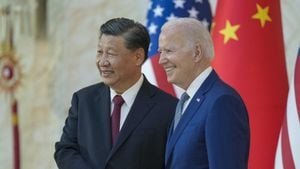Advancements in Indian missile technology have taken center stage recently, sparking interest from defense analysts and policymakers alike. At the forefront of these developments is the latest achievement by the Defence Research and Development Organisation (DRDO), which successfully test-fired the Agni Prime missile, marking yet another milestone for India's strategic capabilities.
The Agni Prime, which is part of the Agni series of missiles, boasts significant improvements over its predecessors. It is capable of carrying nuclear as well as conventional warheads and has enhanced accuracy over longer ranges. The missile's range is reported to be between 1,000 and 2,000 kilometers, allowing India to target potential adversaries within considerable distances.
Many experts agree this advancement is not merely strategic but also symbolic. It reflects India's growing self-reliance in defense manufacturing as the nation aims to strengthen its military capabilities amid regional tensions. "This test signifies not just technological prowess, but India's intent to assert itself on the global stage," remarks Dr. Arun M. Sinha, a defense strategist.
India's missile development program is driven by multiple factors, including geopolitical strategies and the need for effective deterrence capabilities against its neighbors, particularly Pakistan and China. The timing of the Agni Prime's test is noteworthy, coming shortly after heightened border tensions with both nations.
The missile's development also aligns with the Indian government's push for 'Atmanirbhar Bharat' or Self-Reliant India, aiming to reduce imports and boost indigenous manufacturing. This initiative, launched by Prime Minister Narendra Modi, is reshaping India's defense ecosystem to be more autonomous.
Another highlight of this technological leap is the integration of state-of-the-art technologies. The Agni Prime features advanced navigation and control systems, which contribute to its precision targeting. Such improvements are integral, not just for military efficacy, but also to meet international missile standards and regulations.
While the successful test of the Agni Prime is commendable, it also raises questions about the arms race in the region. Experts caution against overly aggressive posturing. "India must balance its advancements with diplomacy and engagement with its neighbors," says Dr. Neeta Rao, who specializes in South Asian security.
Nevertheless, the test has been received positively within India, reinforcing national pride. Defence Minister Rajnath Singh expressed pride over the achievement during the test's celebration, stating India is now among the few nations with such advanced missile technology. His remarks highlight the growing confidence within domestic defense circles.
The significance of the Agni Prime missile doesn’t end with just its technical specifications. It also plays a role in boosting India's posture on the global stage amid discussions about strategic autonomy and influence. With military technology becoming increasingly intertwined with international politics, India's advancements offer new avenues for global partnerships.
Simultaneously, the successful test has evoked reactions from neighboring countries. Pakistan's defense ministry quickly issued statements highlighting their concerns over India's growing military capabilities, intensifying calls for regional discussions focused on de-escalation. This reaction indicates the delicate balance of power dynamics at play.
India remains focused on reducing its reliance on foreign technologies, as exemplified by the Agni Prime program. This strategy has already produced tangible benefits not only for defense but also for wider technological advancements across sectors. The integration of private industries alongside state-owned enterprises has been instrumental for this success.
Looking forward, analysts believe this is just the beginning of India's ambitious plans for missile technology. Future projects may involve the development of hypersonic missiles, which would revolutionize the speed and versatility of India’s delivery systems. Enthusiasm around this potential builds even as military budgets are strategically allocated.
The Indian defense sector now boasts collaborations with several private players, enhancing innovation and competition. Experts say, if maintained, this ecosystem could lead to faster development cycles and increased efficiency, offering India the ability to respond swiftly to shifting global realities.
For many, the crux of the conversation surrounding missiles is often about capability; yet it’s also about demonstrating restraint and using technology wisely. The Agni Prime test serves as both celebration and caution—a step toward self-reliance causes national pride but also bears responsibility on the global stage.
India is not just advancing its military capabilities; it’s also carving its path in international forums, promoting dialogue on arms control and disarmament. Engaging with networks aimed at regulating missile technology could also play to India's strengths, showing its commitment to responsible governance.
India’s drive toward becoming a leading power is fueled by such test launches, and as regional tensions fluctuate, the world will be watching closely. The next few years could define how India balances its advancements with global expectations, especially concerning security and cooperation.
With the global defense environment shifting rapidly, India's strategic decisions will require careful navigation. The Agni Prime missile is not just about deterrence but rather about changing dialogues and perceptions. The consequences of India’s advances resonate well beyond its borders, potentially redefining relationships with partners and rivals.



